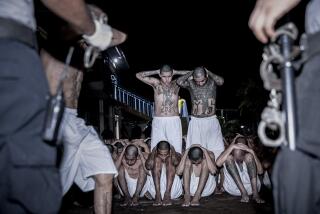El Salvador’s Catholic Church closes key human rights office
MEXICO CITY -- The Roman Catholic Church in El Salvador has abruptly closed its important human rights and legal aid office, which for years, and sometimes at great risk, denounced and investigated the most egregious atrocities surrounding that country’s civil war.
The surprise decision became known Tuesday, when employees showed up for work at the Tutela Legal office in the capital, San Salvador, and found padlocks on the doors and guards who denied them entry.
Many in the international human rights community expressed alarm Wednesday and called for Tutela Legal’s extensive archive -- considered a treasure-trove for investigators as well as a valuable repository of evidence in still-unresolved criminal cases -- to be preserved.
For some, it was especially ominous that the closure came just as El Salvador’s judiciary appeared poised to hear challenges to an amnesty law that, if overturned, might reopen several prominent human rights cases.
“It is a strange coincidence,” Tutela’s director, Ovidio Mauricio Gonzalez, said by telephone from San Salvador. “Just as they are talking about the amnesty, they close Tutela Legal, they close access to the archive, and abandon it to its fate.”
The amnesty law, passed in 1993, protected numerous government officials, military officers and guerrilla leaders from prosecution for acts committed during the 1980-92 civil war. Late last year, the Inter-American Court of Human Rights ruled that the law cannot be used to protect those who ordered and carried out the single largest massacre in the war: the December 1981 slaughter of hundreds of peasants, including children, at El Mozote in northeastern El Salvador.
Last week, the Salvadoran Supreme Court agreed to hear arguments that the amnesty was unconstitutional.
Tutela Legal said its closure was ordered by Jose Luis Escobar Alas, the archbishop of San Salvador. Employees said they were told that, with the war long over, the office was no longer necessary.
Supporters vehemently rejected that reasoning, noting that the organization continued to do important legal work for the poor.
“I am worried about the bad signal this sends,” Salvadoran President Mauricio Funes said in a news conference, adding he did not know the reasons behind the decision.
Tutela Legal was founded in the years leading up to the war by San Salvador’s then-archbishop, Oscar Arnulfo Romero. It became the driving force behind investigations of the most important, emblematic atrocities of the period -- including the 1980 killing of Romero, shot by gunmen linked to the military as he said Mass. Another crucial case was the 1989 military slayings of six Jesuit priests -- one of them the rector of the University of Central America -- as well as their housekeeper and her daughter.
It was also Tutela Legal that pushed for investigation of the El Mozote massacre. For years, the Salvadoran government and army, and the Reagan administration that backed them, strenuously denied that a massacre had taken place. Tutela Legal investigators traveled the country, even at the height of war, to find survivors and piece together witness accounts.
“They were incredibly well trusted by Salvadorans,” said David Holiday, who was the Central America representative for Human Rights Watch in the 1990s and is now with the Open Society Foundations. “Singularly … because of them … we had a very good estimate of what was going on in the war.”
ALSO:
Brazil property rights: Tribes and farmers battle to the death
Syrian schools start new year, a return to some normality for kids
International court accuses Kenyan journalist of witness tampering
Twitter: @TracyKWilkinson
More to Read
Sign up for Essential California
The most important California stories and recommendations in your inbox every morning.
You may occasionally receive promotional content from the Los Angeles Times.











